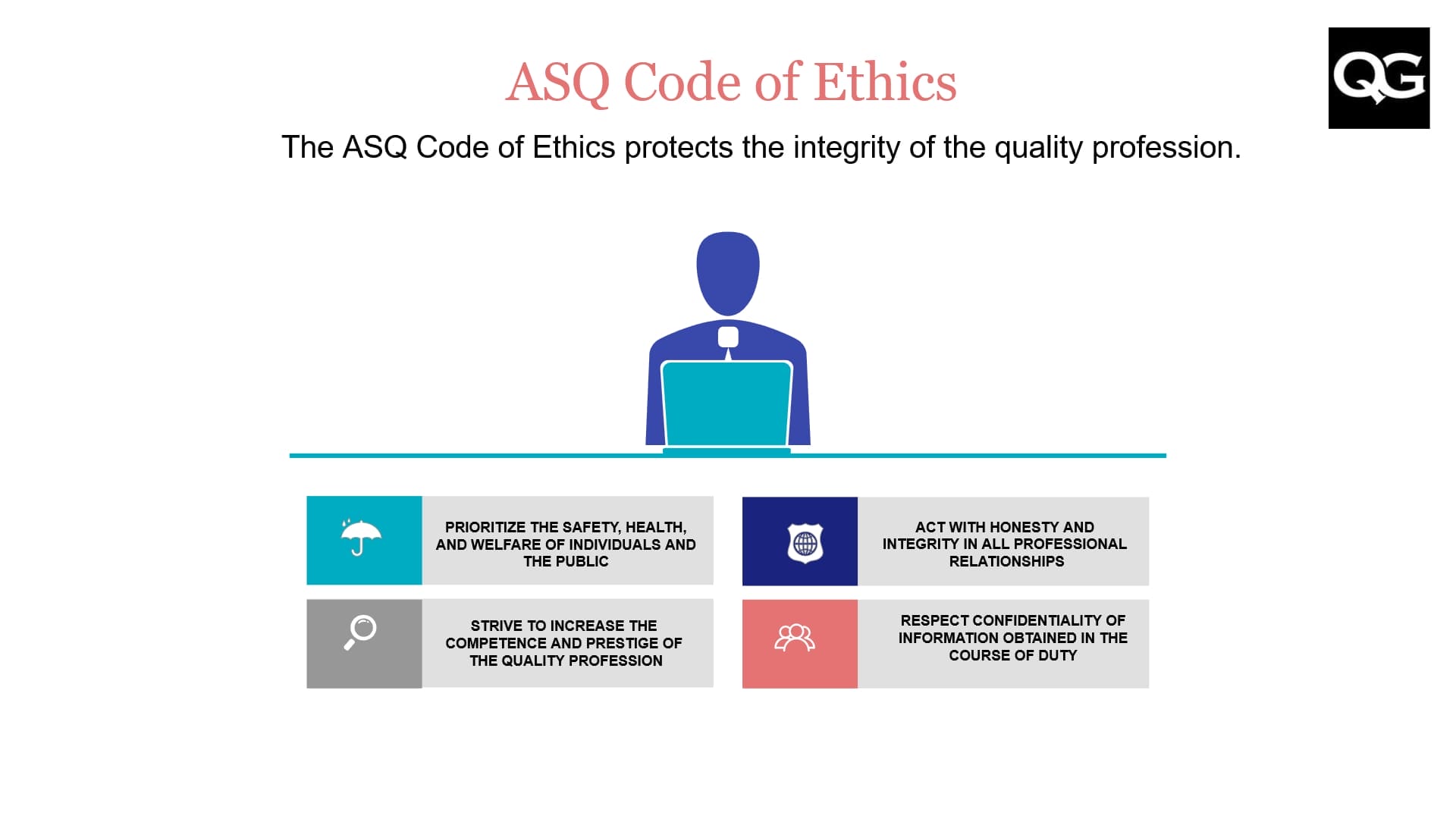The American Society for Quality (ASQ) Code of Ethics defines the professional conduct expected from quality professionals worldwide. It is not just a policy; it is a commitment to uphold integrity, fairness, and competence in all aspects of quality work.
Why the ASQ Code of Ethics is Essential
Quality professionals have a profound impact on organizations and society. Decisions made in quality audits, process improvement, and supplier assessments can influence product safety, customer satisfaction, and organizational reputation. The Code ensures:
- Commitment to public welfare
- Honesty in all professional activities
- Fair treatment of all individuals
- Competence and continual improvement
Failure to adhere to these principles can harm careers, damage organizations, and undermine the credibility of the quality profession.
The ASQ Code of Ethics Explained with Examples
1. Hold Paramount the Safety and Welfare of the Public
Quality professionals must place the health, safety, and welfare of the public above all else.
Example: During a supplier audit, you find a critical defect that could compromise consumer safety. Management pressures you to ignore it to avoid delays. You escalate the issue, emphasizing that public safety is non-negotiable.
Key Takeaway: Always act in the public interest, even when it conflicts with organizational priorities.
2. Act with Honesty and Integrity
All professional interactions and decisions should reflect honesty, integrity, and fairness.
Example: A colleague suggests altering test results to meet customer specifications. You refuse and report the issue through proper channels.
Key Takeaway: Ethical integrity is more valuable than short-term gains or meeting quotas.
3. Conduct Oneself Fairly and Impartially
Treat all individuals fairly, avoid conflicts of interest, and remain impartial in professional judgment.
Example: You are auditing a long-term supplier who offers you a gift to influence the audit outcome. You decline and disclose the incident in your report.
Key Takeaway: Fairness and impartiality safeguard the credibility of quality professionals.
4. Maintain and Improve Competence
Professionals should continually develop their knowledge, skills, and abilities to enhance the quality profession.
Example: You proactively attend training sessions on emerging quality management trends and share insights with your team.
Key Takeaway: Lifelong learning ensures relevance and effectiveness in a rapidly changing environment.
5. Support Professional Colleagues and Organizations
Respect the reputation and efforts of colleagues and organizations while reporting unethical or illegal conduct.
Example: You discover a co-worker misrepresenting audit results. You discuss the issue privately and, if unresolved, escalate it per your organization's ethics policy.
Key Takeaway: Supporting ethical behavior among peers strengthens the profession as a whole.
6. Avoid Conflicts of Interest
Disclose potential conflicts that may compromise objectivity or professional judgment.
Example: You are asked to consult for a company while serving as an auditor for its competitor. You inform both parties and decline the consulting assignment.
Key Takeaway: Transparency prevents compromised decisions and maintains trust.
Practical Tips for Upholding the ASQ Code of Ethics
- Document findings and actions to provide accountability.
- Follow your organization’s reporting protocols for ethical concerns.
- Consult with peers, mentors, or professional associations for guidance.
- Engage in continuous professional development.
Common Ethical Dilemmas for Quality Professionals
| Scenario | Ethical Decision |
|---|---|
| Pressured to approve a noncompliant supplier | Refuse approval and document the issues with recommendations for corrective actions. |
| Discovering a co-worker using outdated calibration certificates | Report the issue through proper channels to prevent inaccurate measurements. |
| Being offered payment to disclose a competitor’s quality processes | Decline the offer and maintain confidentiality. |
Relevance to ASQ Certifications
ASQ certification exams often include questions about ethical practices. For example:
Sample Question:During an audit, you uncover falsified records. What should you do?
Correct Answer: Document the findings and report them to appropriate management while maintaining confidentiality.
Understanding and applying the Code prepares you not just for exams but for your professional responsibilities.
Final Thoughts
The ASQ Code of Ethics serves as a guide to uphold integrity, fairness, and professional excellence. Applying these principles protects the public, enhances organizational success, and strengthens the quality profession.
By living these values daily, quality professionals earn trust and respect as ethical leaders in their field.

